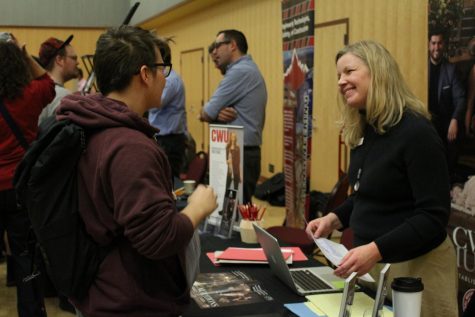How to choose your major
November 13, 2019
After completing general education requirements, students are tasked with picking a degree. Ian Morris, a program coordinator in the career services department, said if students aren’t sure what they want to pursue, an aptitude test can bring clarity.
“We can do an aptitude [test] and say here are the things you seem to enjoy that might resonate well with you, and here are the things that might be red flags and have you thought [about] the role that these [red flags] have in this career,” Morris said.
Morris also said picking a degree that fits your potential job aspiration is important how ever things happen in life.

“I myself am a humanities major. I graduated in anthropology and I decided I wanted to work in tech, so I aggressively started teaching myself tech skills and now I work as a data consultant. I didn’t have that degree. I didn’t have that formal background, but it didn’t prevent me from pursuing that career path,” Morris said.
A few tips Morris brought up for students is informational interviewing. A student would interview someone in their profession of choice, say business management.
Morris said to talk with them about their job and what a typical day looks like for that individual. A conversation like that can reinforce a student’s beliefs about the job or help students realize they may need to change degree programs. An exploratory internship is another tip Morris brought up. Morris knew he wanted to work in education, however, after taking an internship at a Montessori school he was happy he didn’t spend four years studying elementary education. Morris realized he needed to switch to another area of education.
“Picking the right major early on will really help streamline the path you want to go on, but I also don’t think that its life or death if you pick the right major right now because that’s really just a piece of the equation,” Morris said.
Morris also said choosing a minor can set an applicant apart from the competition because it’s a specialized niche that uniquely brands that particular applicant.
Daniel Beck a biological sciences professor, is also the director for the center for Latino and Latin American studies. With the current issues we have in the world today, understanding different cultures is necessary.
“It’s important to get outside of your comfort zone and learn about people who are different than you. Cultures that might be different than yours, that’s what college is all about,” Beck said.
Marna Carroll, the director of the American Indian studies minor, is not only trying to gain exposure for the minor but also hopes students realize the minor can be used in different areas.
“I [was] just talking to a former student yesterday who recently got a position working with a group [of] advocates for the Indian Child Welfare Act,” Carroll said.
Carroll also said, students in the science field, specifically environmental science, should look into the program because some of the biggest employers in the state are Native American tribes.
Currently, the American Indian studies program has 14 students enrolled, Carroll hopes to have 20 students in the minor by end of the year. Once again she mentioned that the minor crosses over with many departments like anthropology, sociology, environmental science and resource management.
Morris said employers are also seeing the value in specific areas of expertise while also realizing how important it is to value different perspectives and opinions of other cultures.
“Those kinds of minors really create unique opportunities for people who want to work in those communities or with those audiences to brand themselves in a way that makes them specialized to work with that community or audience,” Morris said.
According to Morris, the best advice to students is to think broadly about what field they want to go in. Your degree may not end up being the career an individual thought they would have. The program that a student chooses should provide useful skills that apply to that student’s chosen career.


Culinary School Bergen County NJ • Jun 10, 2020 at 8:19 am
Choosing a major is an important process in a student’s college career, however choosing a minor can be just as important. When students have a minor this can set them apart from competitors because it is a specialized niche branded specifically towards them. Thank you for the great advice.